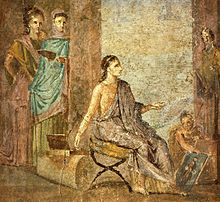- Priapeia
-
The Priapeia is a collection of ninety-five poems in various meters on subjects pertaining to the phallic god Priapus. It was compiled from literary works and inscriptions on images of the god by an unknown editor, who composed the introductory epigram. From their style and versification it is evident that the poems belong to the classical period of Latin literature. Some, however, may be interpolations of a later period. They will be found in F. Bitchelers Peironius (f 904), L. Mullers Catullus (1870), and E. Bahrens, Poetae latini minores, I. (1879).
These poems were posted upon statues of Priapus[citation needed] that stood in the midst of gardens as the protector of the fruits that grew therein. These statues were often crude carvings made from tree trunks. They roughly resembled the form of a man with a huge phallus. The statues also promoted the gardens’ fertility.
The verses are attributed variously to Virgil, Ovid, and Domitius Marsus. However, most authorities on the matter regard them to have been the work of a group of poets who met at the house of Maecenas, amusing themselves by writing tongue-in-cheek tributes to the garden Priapus. (Maecenas was Horace’s patron.) Others, including Martial and Petronius, were thought to have added more verses in imitation of the originals.
In the 19th century, the Priapeia were translated into English by Leonard Smithers and Sir Richard Burton (the latter of whom also freely translated The Book of the Thousand Nights and a Night), who provided numerous glosses concerning the sexual practices and proclivities that are referenced in the poems. These explanatory notes address such diverse topics as irrumation, cunnilingus, masturbation, bestiality, sexual positions, eunuchism, phalli, religious prostitution, aphrodisiacs, pornography, and sexual terminology, but are not always accurate scholarly reflections of ancient Roman practices. A more recent translation titled The Priapus Poems has been carried out by Richard W. Hooper [1].
The poems include monologues by Priapus in which the god congratulates and praises himself for the size and virility of his sexual parts and issues fearful warnings to those who would trespass upon his garden or attempt to steal its fruits, threatening such miscreants with various punishments of a sexual nature, such as irrumation and sodomy.
In the “Introduction” to the Priapeia, the translators point out that “The worship of Priapus amongst the Romans was derived from the Egyptians, who, under the form of Apis, the Sacred Bull, adored the generative Power of Nature,” adding that “the Phallus was the ancient emblem of creation, and representative of the gods Bacchus, Priapus, Hermaphroditus, Hercules, Shiva, Osiris, Baal and Asher, who were all Phallic deities.”
References and notes
 This article incorporates text from a publication now in the public domain: Chisholm, Hugh, ed (1911). Encyclopædia Britannica (11th ed.). Cambridge University Press.
This article incorporates text from a publication now in the public domain: Chisholm, Hugh, ed (1911). Encyclopædia Britannica (11th ed.). Cambridge University Press.
- ^ Richard W. Hooper (ed.) 1999. The Priapus Poems. Urbana and Chicago, IL: University of Illinois Press. ISBN: 0-252-06752-5. See also: Butrica, J. L. 2000. "Richard W. Hooper (ed.) The Priapus Poems. Urbana and Chicago, IL: University of Illinpis Press, 1999. ISBN: 0-252-06752-5". Bryn Mawr Classical Review 2000.02.03. Available from the WWW: http://ccat.sas.upenn.edu/bmcr/2000/2000-02-23.html.
- ^ Martial and Juvenal have many references to eunuchism and the use to which the Roman ladies put these castratos, who were of various kinds: castrati (castare, meaning to cut oft)--those who had lost both penis and testicles; spadones (either spata, a Gallic word meaning a razor, or Spada, a Persian village where the operation of eunuchism is performed)--those who still retained the penis; thlibiae (from the Greek meaning to rub with hemlock, etc.)--those whose testicles had been extracted by compression; thliasiae (from the Greek meaning to crush); cremaster (so called from the destruction of the muscle, cremaster, by which the testicle is suspended or drawn up or compressed in the act of coition); and bagoas. The subject scarcely calls for extended notice in this work, but I would refer those interested in the subject to The Book of the Thousand Nights and a Night, translated by Sir Richard F. Burton.
- ^ Praecidere (literally meaning to cut off). Here means to cut through the bowels. It has a similar meaning in Juvenal--'to run against yesterday's supper'. Like expressions are billas dividere, 'to divide the bowels', and cacare mentulam, 'to defile the mentule with ordure'.
- ^ In the original, magnis testibus, meaning trustworthy witness; and, by a play upon words, large testicles.
External links
- For an online edition of the entire translation see: Priapeia
Categories:- Latin poetry
- Ancient Roman erotic literature
Wikimedia Foundation. 2010.

